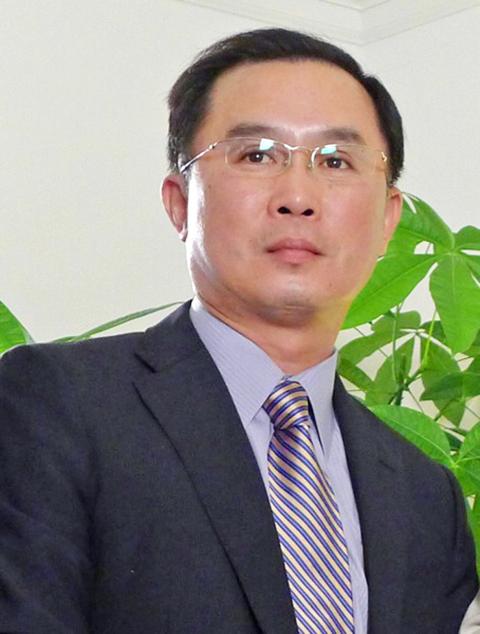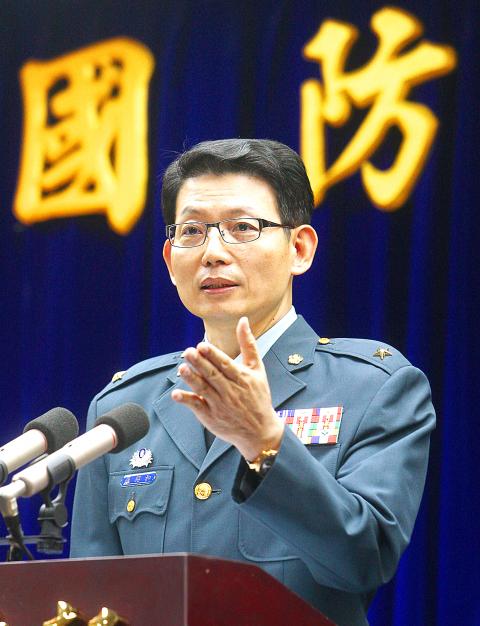The Ministry of National Defense confirmed yesterday that Army Major General Li Hsien-sheng (黎賢聖), who was the director in charge of Taiwan’s defense mission in the US, has been removed from his post after he failed lie-detector tests in May.
It has been reported that Li made “unauthorized contacts” in the US.
The removal of Li from his post has raised alarm bells because the defense mission, which has an office in Washington, is responsible for the air force’s purchase of upgrades to its F-16A/B jets, procurement and upgrading of the US long-range early-warning radar system and other arms deals, as well as conducting dialogue on Taiwan-US strategic military planning.

Photo: CNA
As such, experts said the mission has access to highly classified information and military intelligence, and has high-level contact with the US Department of Defense. Therefore, the removal of Li from his post after failing a lie-detector test is of great concern in military and national security circles.
Li’s situation has also raised eyebrows because he was a trusted aide of former minister of national defense Kao Hua-chu (高華柱), and had access to sensitive information on Taiwan-US military exchanges and arms programs.
Ministry spokesman Major General David Lo (羅紹和) said yesterday Li was replaced as head of the mission by navy Rear Admiral Yang Ta-wei (楊大偉) and that Li is now back in Taiwan serving at the Army Command Headquarters.

Photo: CNA
These are troubled times for the defense mission, as it has had four directors within the past five years, with Li being the latest casualty.
Former director Chen Ching-chung (陳敬忠) was investigated for unauthorized use of funds for intelligence operations and charged with corruption in 2010.
Other Taiwanese military officials at the mission have been dismissed for being involved in bribery scandals and having “suspicious contacts” with arms dealers.
The lie-detector tests are administered to staff stationed overseas to check if a subject has had contact with “inappropriate people,” such as Chinese nationals and foreign spies.
Lo said the questions administered during the polygraphs were classified and no details can be divulged.
“The ministry is conducting a further investigation into this matter. Li is facing up to the situation in a calm, straightforward manner. He wants to prove that he has not done anything to let down his country,” Lo said.
He said that failing the test does not mean Li lied, because the results could be affected by other factors, such as physical or mental condition, medication and fatigue after flying back to Taiwan.

MAKING WAVES: China’s maritime militia could become a nontraditional threat in war, clogging up shipping lanes to prevent US or Japanese intervention, a report said About 1,900 Chinese ships flying flags of convenience and fishing vessels that participated in China’s military exercises around Taiwan last month and in January last year have been listed for monitoring, Coast Guard Administration (CGA) Deputy Director-General Hsieh Ching-chin (謝慶欽) said yesterday. Following amendments to the Commercial Port Act (商港法) and the Law of Ships (船舶法) last month, the CGA can designate possible berthing areas or deny ports of call for vessels suspected of loitering around areas where undersea cables can be accessed, Oceans Affairs Council Minister Kuan Bi-ling (管碧玲) said. The list of suspected ships, originally 300, had risen to about

DAREDEVIL: Honnold said it had always been a dream of his to climb Taipei 101, while a Netflix producer said the skyscraper was ‘a real icon of this country’ US climber Alex Honnold yesterday took on Taiwan’s tallest building, becoming the first person to scale Taipei 101 without a rope, harness or safety net. Hundreds of spectators gathered at the base of the 101-story skyscraper to watch Honnold, 40, embark on his daredevil feat, which was also broadcast live on Netflix. Dressed in a red T-shirt and yellow custom-made climbing shoes, Honnold swiftly moved up the southeast face of the glass and steel building. At one point, he stepped onto a platform midway up to wave down at fans and onlookers who were taking photos. People watching from inside

Japan’s strategic alliance with the US would collapse if Tokyo were to turn away from a conflict in Taiwan, Japanese Prime Minister Sanae Takaichi said yesterday, but distanced herself from previous comments that suggested a possible military response in such an event. Takaichi expressed her latest views on a nationally broadcast TV program late on Monday, where an opposition party leader criticized her for igniting tensions with China with the earlier remarks. Ties between Japan and China have sunk to the worst level in years after Takaichi said in November that a hypothetical Chinese attack on Taiwan could bring about a Japanese

The WHO ignored early COVID-19 warnings from Taiwan, US Deputy Secretary of Health and Human Services Jim O’Neill said on Friday, as part of justification for Washington withdrawing from the global health body. US Secretary of State Marco Rubio on Thursday said that the US was pulling out of the UN agency, as it failed to fulfill its responsibilities during the COVID-19 pandemic. The WHO “ignored early COVID warnings from Taiwan in 2019 by pretending Taiwan did not exist, O’Neill wrote on X on Friday, Taiwan time. “It ignored rigorous science and promoted lockdowns.” The US will “continue international coordination on infectious